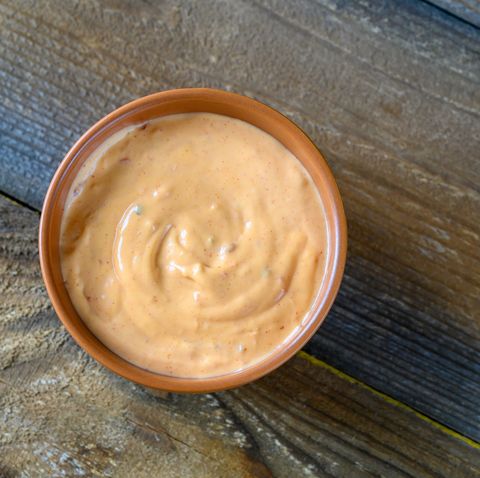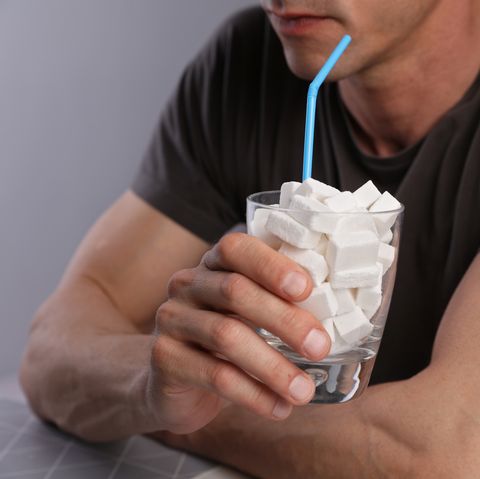Here's Why You're Having 'COVID-Cravings' for Weird Foods
The craving struck me about two weeks ago. My brain’s message was clear and direct.
You want Russian dressing.
I tried to shake the thought, but the more I fought it, the more my brain dug in. And then, sure enough, during my next weekly grocery shopping trip, I picked up a bottle to later glop atop a mixed greens salad.
My craving for Russian dressing wasn’t an isolated incident. For whatever reason, I picked up a box of S’mores Pop Tarts the other day. I’m still jonesing for salmon roe. Yes, salmon roe.
I’m not alone either. Friends of mine send me pictures of weird chip flavors they’ve picked up at the grocery store. Another texted yesterday to tell me he ate a Sloppy Joe for breakfast. The hashtag #covidcooking has more than 85,000 photos on Instagram and is splattered with everything from banana cinnamon donuts to Spam mee pok tah.

Hill Street Studios
So what’s driving all these weird cravings?
The idea that my body needed some particular type of nutrient within the Russian dressing (the easily digestible carbohydrates in all the high fructose corn syrup, perhaps?), has long been debunked.
New science shows that food cravings operate via a complex and intricate network that involves many parts of the brain.
And there’s a big complicating factor about food cravings as it relates to the coronavirus COVID-19, self-quarantine, and the worldwide fear brought about by a pandemic: stress.
To help delve deeper into the psyche of why COVID-cravings seem to be a thing, I contacted Kent Berridge, Ph.D., a James Olds Distinguished University Professor of Psychology and Neuroscience at the University of Michigan Department of Psychology.
Berridge’s lab studies, among other things, how the brain generates pleasure, controls appetite, and learns reward.
Here’s what Berridge had to say about food cravings—Russian-dressing related and otherwise.
Are random cravings for certain foods really “random?”

AlexPro9500
“What guides the specific target of our cravings—that neuroscience does not yet understand very well,” says Berridge. “We can say at least that specific food cravings are not random. They’re specific to you as an individual, and your history with foods, and your particular likes and dislikes.”
In short, one person’s Russian dressing is another person’s Sloppy Joes.

Subscribe to Men’s Health
SHOP NOW
Berridge continues: “We have a good idea of how brain craving circuitry works to power the intensity of cravings, but not so good an understanding of what controls the specific target of a focused craving, though that’s an issue that my lab does now study.”
Do cravings for certain types of foods increase with stress?

ChesiireCat
“Yes, definitely. Virtually all stresses trigger what’s been called the brain’s master stress neurotransmitter, CRF (corticotropin releasing factor) in hypothalamus, amygdala, and nucleus accumbens—parts of brain-craving circuitry,” Berridge says.
Stress can ignite and inflame. “CRF can directly promote craving itself,” says Berridge. Plus, CRF can “also contribute to the unpleasantness of some stressors by acting in other brain structures, and some foods may be eaten more then as ‘hedonic self-medication.'”
Anyone who has ever given into a craving for crummy food (S’mores Pop Tarts, as one example) and then suffered some guilt for doing so knows what Berridge is talking about.
Could a heightened amount of prolonged stress (say, from a worldwide epidemic) create opportunities for more stress eating?
“Yes, to the degree home isolation and financial consequences are stressful, that would definitely set the stage for the processes above to kick in and magnify craving,” says Berridge.
Most stressful cravings are for highly palatable foods that are also high in calories, says Berridge. (See: sugary dressing, sugary cookies posing as breakfast pastries, sugary Sloppy Joes.)
And so I thought about it some more. While I do remember eating Russian dressing on salads when I was younger, I think that maybe I was actually craving the comfort provided by my yearly summertime Big Mac indulgence. Big Mac sauce sure does tastes a heck of a lot like Russian dressing.
And the comfort food factor, be it from the nostalgia for a Big Mac or Spam-and-noodles, how strong is that when it comes to COVID-cravings?
“That probably has more to do with other psychological cognitive processes and memories having to do with the notion of comfort, rather than basic food-craving circuitry,” says Berridge.
So, in a sense, take me back to the Big Mac days.
Source: Read Full Article
